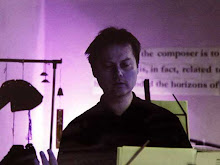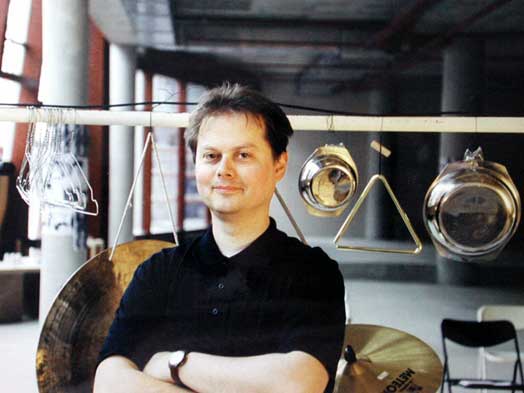"Für mich zählt einzig und allein das Schreiben, die Herstellung eines Romans, denn während ich das tue, in diesem speziellen Moment, bin ich in der Welt, über die ich schreibe. Sie ist für mich wirklich, ganz und gar. Wenn ich dann fertig bin und aufhören muß, mich für immer aus dieser Welt zurückziehen muß – daß zerstört mich. (...)
Ich verspreche mir selbst: nie mehr schreibe ich einen Roman. Nie mehr denke ich mir Menschen aus, von denen ich letztlich doch wieder abgeschnitten sein werde. Ich sage es mir ... und fange heimlich, still und leise ein neues Buch an." – Philip K. Dick (aus: Notes Made Late at Night by a Weary SF Writer, 1968)
Der schreibende Triebtäter Philip K. Dick (1928-1982) erschaffte trotz seines frühen Todes mehr als 40 Romane und über 100 Erzählungen, im Laufe seiner verbissenen Versuche im Science-Fiction Genre seine schriftstellerische Existenz zu bestreiten. Da Bücher und Magazine im Science-Fiction Bereich in den 50ern und 60ern lange als Dutzendware betrachtet ("pulp fiction") und sehr schlecht bezahlt wurden, ungeachtet der Originalität vieler Werke, erhöhte er seine Produktion auf manische Weise. Sein Ehrgeiz brachte ihn zeitweilig dazu 60 Seiten pro Tag zu schreiben, was für längere Strecken nur noch unter Einnahme von Aufputschmitteln wie Amphetaminen zu bewerkstelligen war – Selbstausbeutung pur. Später kamen Halluzinogene wie LSD dazu. Ein Leben als andauernde Erforschung, Selbsterkundung, und – im wahrsten Sinne des Wortes – Über-Forderung. Seine Obsessionen gebaren denn auch ein Katalog aus Problemen, der ihn Zeitlebens begleitete und heimsuchte.
Er schrieb auch Romane die als Gesellschaftsromane bezeichnet werden – wie wohl es auch hier um Identität und Wahrnehmungsfähigkeit ging – in der Hoffnung einen Zugang zum mainstream Markt zu erhalten, aber sein Stil war wohl zu eigenwillig um einen Risikobereiten Verleger mit großem Werbe-Etat anzulocken, die Vorurteile der Branche nagelten ihn auf das Science-Fiction Genre fest. Bücher wie Confessions of a Crap Artist bleiben dennoch lesenswert.
Öffentliche Anerkennung für seine fekunde schriftstellerische Leistung erfuhr er zu seinen Lebzeiten nur spärlich, der Erfolg stellte sich erst kurz vor seinem Tod ein. Seine zahlreichen Scheidungen dürften seinem Konto auch nicht gut getan haben. Ironischerweise zählen viele seiner Bücher mittlerweile zu den sogenannten Klassikern der amerikanischen Moderne. Nach seinem Tode. Dieser Modus kommt Einem bekannt vor, nicht wahr? Rückblickend waren Schlaganfall und Herzversagen wohl eine zu erwartende, heraufbeschworene, wenn auch traurige, Konsequenz des erschöpfenden Auf und Ab dieses unter chronischen Selbstzweifeln, paranoiden Schüben und Alkohol- und Medikamenten-Abusus leidenden, schöpferischen Menschen. Schreiben als Zwang, als Kampf um Existenz, als Ventil, und als Therapie? Ich kann mir nicht vorstellen, dass das Schreiben für Dick eine Tätigkeit der Freude gewesen ist. Aber in seiner Biographie schildert Lawrence Sutin das dem doch so war. Dick war vom Schreiben besessen. Offensichtlich wurde er geboren, um zu Schreiben.
Dick's eigenwillige Romanaesthetik empfinde ich als derart genre-übergreifend, daß man bei ihm nicht von Science Fiction im technoiden Sinne sprechen sollte, sondern viele Bücher eher zu einer Gattung von "inner space"-Abenteuerromanen zählen könnte, so man denn unbedingt eine Schublade haben muss...
Für mich stellen viele seiner Romane und Erzählungen ohnehin Psychodramen im übergreifenden Sinne dar, manche mit einem derart prägnanten Schuß noir oder auch des Grotesken, dass man viele der Geschichten aus seinem Universum auch als psychotische soap operas begreifen kann.
Persönlich, kann ich nur jedem neugierigen Leser Dick's Roman UBIK (geschrieben 1966, Erstveröffentlichung 1969) an's Herz legen. Ein absolutes Lesevergnügen. Grossartig!
Es hat zwar ein wenig gedauert, bis sich die Filmindustrie an Philip Kindred Dicks komplexen Geschichten über Identitätskrisen und Realitätsverlusten herangetraut hat, aber seit Blade Runner im Jahre 1982 (nach dem Roman Do Androids Dream of Electric Sheep? – geschrieben 1966, Erstveröffentlichung 1968) in die Kinos kam, haben seine Erzählungen und Romane mit ihrem "nichts ist wirklich so, wie es erscheint"-Blick auf illusorische Realitäts- und Wahrnehmungserfahrungen, zunehmend entweder die Stoffentwicklung für Drehbüchern befruchtet oder als direkte Vorlage für Filme wie Total Recall (nach We Can Remember It For You Wholesale), Confessions d'un Barjo (nach Confessions of a Crap Artist) und Screamers (nach Second Variety) gedient.
Matrix, eXistenZ und The Truman Show aus 1998 (siehe Dick's Time Out of Joint (1959), dt. Zeit Aus Den Fugen) beruhen ebenso auf seine Arbeiten und Ideen.
In den letzten Jahren hat eine weitere Flut von Verfilmungen eingesetzt: Minority Report (2002), Imposter (2002), Paycheck (2003), A Scanner Darkly (2006), Next (2007, nach The Golden Man) und, in diesem Jahr, Radio Free Albemuth. Für 2009 ist die Verfilmung von The Owl in Daylight, ein Roman den Dick nicht mehr fertigschreiben konnte, geplant.
Es folgt ein Ausschnitt aus der Wikipedia Biographie über P. K. Dick:
"Das Erkennen der Wirklichkeit ist immer wieder zugleich Problem wie auch Spannungsmoment in seinen Romanen, viel mehr als etwa die Entwicklung einer Story zum passiven Konsum. Im Stil des Philip K. Dick wird der Leser szenenweise von der Gedankenwelt des einen Protagonisten in die des nächsten geführt. Auf diese Weise entsteht ein Pluralismus, der eine kategorische Absage an den Ich-Erzähler verkörpert und dennoch die Protagonisten nicht unreflektiert von außen betrachtet, sondern ihre teilweise gegensinnigen Ansichten aber auch Weltvorstellungen nebeneinander stellt. Viele Geschichten enden weder glücklich noch tragisch, sondern lassen den verwirrten Leser am Ende des Buches allein. Er muss sich seine eigene Wirklichkeit aufbauen, nachdem er eine gewisse Zeit mit Dicks Figuren verbracht hat.
Dick ist gelegentlich als Drogen-Autor beschrieben worden. Damit verbunden ist die Loslösung des Realen von der individuellen Wirklichkeit. Denn im gewissen Sinne – so Dick – verdrängt jeder Mensch Teile der Realität. Aber Dick beschäftigt sich immer wieder mit dem Glauben oder Geist als Bindeglied oder Barriere zwischen den Menschen, im Zusammenhang mit einer der Religionen, mit der Philosophie (Existentialismus) oder der Wissenschaft. Drogen, Konsum, Kapitalismus, Gesellschaft, Medien, Machtmissbrauch, Verfolgungswahn, Psychoanalyse, Überwachungsstaat, und immer wieder der 2. Weltkrieg in alternativen Szenarien (Deutschland gewinnt und besetzt Amerika, z.B. in Das Orakel Vom Berge) mischen sich mit den "klassischen" Themen (Raum- und Zeitreisen, Telepathie, genetische Mutationen, Außerirdische, ...) des Science-Fiction.
Das besondere bei Dick ist dabei, dass alle Handlungsstränge einer typischen Dick-Logik folgen, die zur Katastrophe führen, die aber keine Katastrophe ist, sondern nur das Erkennen des ganz normalen Wahnsinns. Die Erkenntnis als Dauerthema in Dicks Werk ist also ein zweischneidiges Schwert."
Des Weiteren sei jedem neugierigen Dick Erforschenden die Biographie von Lawrence Sutin ans Herz gelegt – "Philip K. Dick, Göttliche Überfälle" (Frankfurter Verlagsanstalt, 1994, bzw. Haffmans Verlag, Zürich, 1994) – sehr empfehlenswert!
Die amerikanische Originalausgabe erschien 1989 unter dem Titel "Divine Invasion: A Life of Philip K. Dick" bei Harmony Books, New York.
Zuletzt noch einen selbstironischen Auszug aus einem von Dicks Selbstdarstellungen:
"Philip K. Dick (...) lebt jetzt in San Rafael und steht auf Halluzinogene und das Schnupfen. (...) Er ist verheiratet, hat zwei Töchter und eine junge, hübsche, nervöse Frau namens Nancy, die sich vor Telefonen fürchtet. (...) Die meiste Zeit verbringt er damit, erst Scarlatti, dann Jefferson Airplane und anschließend in einem Versuch alles unter einem Hut zu bringen, die Götterdämmerung zu hören. Er hat zahlreiche Phobien und geht selten aus, läßt sich in seiner netten , kleinen Bleibe am Wassser aber gern besuchen . Er schuldet seine Gläubigern ein Bermögen, das er nicht hat. Warnung: Leiht ihm kein Geld. Außerdem klaut er einem die Tabletten."
– Philip K. Dick (aus:Biographical Material, verfaßt 1968, wahrscheinlich auf Wunsch eines Verlags)
LINKS
P.K. Dick Bio & Bibliographie - Wikipedia (Deutsch)
P.K. Dick Bio & Bibliography - Wikipedia (English)
P.K. Dick official site (English)
















